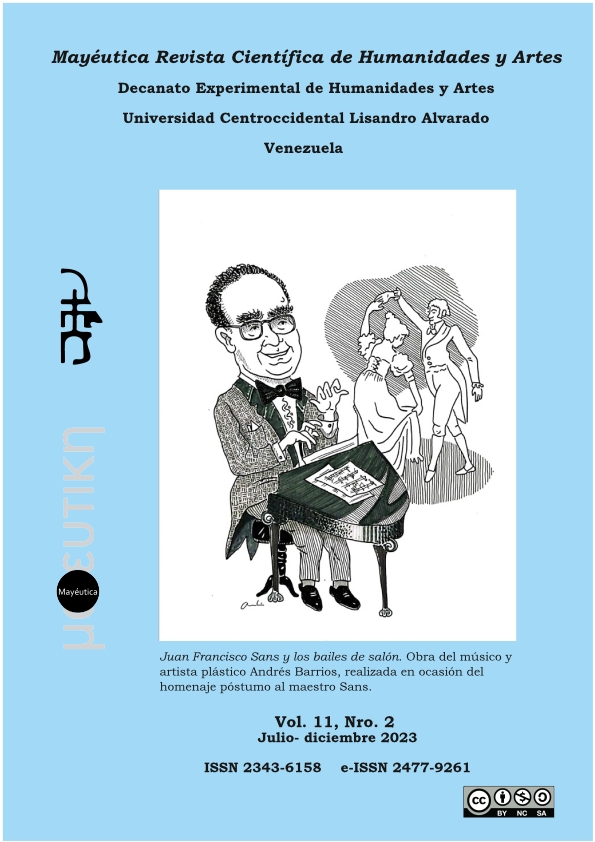La Social responsibility in nongovernmental organizations of the health sector in the state of Lara, Venezuela
A study from the paradigm of sustainable human development
DOI:
https://doi.org/10.5281/zenodo.8188089Keywords:
Social Responsibility, NonGovernmental Organizations, Sustainable Human Development, Sustainable Development GoalsAbstract
The purpose of the research was to analyze, based on the versions of its executives, the Social Responsibility management processes of three NonGovernmental Organizations of
the health sector of the estado Lara, Ascardio Alaplaf and the Cruz Roja, from the Sustainable Human Development approach. It is a qualitative research with interpretative
paradigmatic posture with a phenomenologicalhermeneutical approach. The technique of gathering information was the indepth interview, and the data was interpreted from the
hermeneutics of the managers' versions. For the analysis of the information, theoretical triangulation was made of the information obtained, the categories and the informants'
versions. Among the findings, it is highlighted that Social Responsibility in NGOs is conceived, even without explicitly establishing it in its management philosophy, as a commitment with workers, the community, users and society in general, in line with the economic dimensions, Social and Environmental Development of Sustainable Human Development and the Sustainable Development Goals of the United Nations. In addition, the NGOs in their more than four decades of operation have managed to sustain themselves financially even in the times of humanitarian emergency that Venezuela is going through.
Downloads
References
Asamblea General de las Naciones Unidas. (1987). Informe de la Comisión Mundial sobre el Medio Ambiente y el Desarrollo Nota del Secretario General. https://documentsddsny.un.org/doc/UNDOC/GEN/N87/184/70/PDF/N8718470.pdf?OpenElement
Aznar, M. y Barrón, A. (2017). El Desarrollo Humano Sostenible: un compromiso educativo. Ediciones Universidad de Salamanca. https://doi.org/10.14201/teoredu291253
Fundación Vicente Ferrer. (2017). Guía de los ODS para las Organizaciones del Tercer Sector. http://fundacionvicenteferrerodsmadrid.org/wpcontent/uploads/2017/10/GuiaODSorganizaciones3Sector_F.VicenteFerrer.pdf.
Gómez, D. (2011) El Pacto Global de las Naciones Unidas: sobre la responsabilidad social, la anticorrupción y la seguridad. Prolegómenos. Derechos y valores, XIV (28), 217-231. http://www.redalyc.org/articulo.oa?id=87622536014
Griffin. (s/f). Desarrollo Humano origen, evolución e impacto.https://www.yorksj.ac.uk/media/contentassets/socialeconomy/documents/
GriffinDesarrolloHumano.pdf
Guédez, V.(2004). Ética, política y reconciliación. Editorial Planeta.
Guerra, A. (2014). Desarrollo Humano Integral compromiso de todos. Ediciones del Banco Central de Venezuela y Cátedras Libres de la Universidad Centroccidental Lisandro Alvarado.
Kliksberg, B. (2006). El Capital Social. Dimensión Olvidada del Desarrollo. Universidad Metropolitana, Editorial Panapo.
Martínez, M. (2009). Ciencia y arte en la metodología cualitativa. (2° ed.). Editorial Trillas.
Méndez,Ch.(2003).Responsabilidad social de empresarios y empresas en Venezuela durante el siglo XX. Gráficas Acea.
Okuda, M y Gómez, C. (2005). Metodología de investigación y lectura crítica de estudios. Métodos en investigación cualitativa: triangulación. Revista Colombiana de Psiquiatría, XXXIV (1), 118.124. https://www.redalyc.org/articulo.oa?id=80628403009
Organización de Naciones Unidas. (s.f.). Carta de las Naciones Unidas, Capítulo X: El Consejo Económico y Social. https://www.un.org/es/aboutus/uncharter/chapter10
Pinzón Camargo, M. A. (2005) El papel de las ONG y sus alcances en la responsabilidad social empresarial. Revista Ópera. 5 (5), 75-96. https://www.redalyc.org/articulo.oa?id=67550506
Sen, A. (2009). Desarrollo y Libertad. (9° ed.). Editorial Planeta.
Skibick Araujo, M. (2009). Las ONG como vía al desarrollo y a la transformación social: un estilo de intervención y participación. (Tesis doctoral). Universidad Autónoma de Barcelona. https://www.tdx.cat/bitstream/handle/10803/107962/msa1de1.pdf?
sequence=1
Tenorio, F. (2015). Gestão de ONGs: principais funções gerenciais. Editora FCV.
Vives, Corral, e Isusi (2005). Responsabilidad social de la empresa en las pymes de Latinoamérica. Banco Interamericano de Desarrollo,Ikei.
Published
How to Cite
Issue
Section
Copyright (c) 2023 Francy Lisseth Montoya Gámez

This work is licensed under a Creative Commons Attribution-NonCommercial-ShareAlike 4.0 International License.





